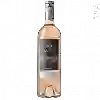
Winery Vignerons ArdéchoisChâtaignier Chatus
In the mouth this red wine is a powerful with a nice balance between acidity and tannins.
This wine generally goes well with
Taste structure of the Châtaignier Chatus from the Winery Vignerons Ardéchois
Light | Bold | |
Smooth | Tannic | |
Dry | Sweet | |
Soft | Acidic |
In the mouth the Châtaignier Chatus of Winery Vignerons Ardéchois in the region of Méditerranée is a powerful with a nice balance between acidity and tannins.
Wine flavors and olphactive analysis
On the nose the Châtaignier Chatus of Winery Vignerons Ardéchois in the region of Méditerranée often reveals types of flavors of spices, red fruit.
Details and technical informations about Winery Vignerons Ardéchois's Châtaignier Chatus.
Discover the grape variety: Chatus
Chatus noir is a grape variety that originated in France (Cévennes). It produces a variety of grape specially used for wine making. It is rare to find this grape to eat on our tables. This variety of grape is characterized by medium-sized bunches and small grapes. Chatus noir can be found in several vineyards: South-West, Cognac, Bordeaux, Loire Valley, Provence & Corsica, Rhone Valley, Savoie & Bugey, Beaujolais, Languedoc & Roussillon.
Last vintages of this wine
The best vintages of Châtaignier Chatus from Winery Vignerons Ardéchois are 2021, 2020, 2019, 0 and 2018.
Informations about the Winery Vignerons Ardéchois
The Winery Vignerons Ardéchois is one of of the world's greatest estates. It offers 148 wines for sale in the of Ardèche to come and discover on site or to buy online.
The wine region of Ardèche
The wine region of Ardèche is located in the region of Méditerranée of Vin de Pays of France. Wineries and vineyards like the Domaine Le Liby or the Domaine Vignerons Ardéchois produce mainly wines red, white and pink. The most planted grape varieties in the region of Ardèche are Viognier, Merlot and Cabernet-Sauvignon, they are then used in wines in blends or as a single variety. On the nose of Ardèche often reveals types of flavors of cream, mango or red cherry and sometimes also flavors of oaky, cassis or strawberries.
The wine region of Méditerranée
Méditérranée is a PGI title that covers wines produced in a large area of the South-eastern coast of France, roughly corresponding to the wine region of Provence but also including Part of the Rhône Valley. The PGI shares its territory with multiple AOC appellations as varied as Châteauneuf-du-Pape, Bandol and Côtes de Provence. The PGI Méditérranée catchment area extends over 10 departments (including the two on the island of Corsica), as well as smaller parts of the Isère, Loire and Rhône departments. Viticulture is essential to the culture and economy of this part of France.
The word of the wine: Sulphur
An antiseptic and antioxidant substance known since antiquity, probably already used by the Romans. But it was only in modern times that its use was rediscovered. It will allow a better conservation of the wine and thus favour its export. Sulphur also gave the 18th century winegrower the possibility of extending the maceration period without fearing that the wine would turn sour and thus go from dark rosé wines to the red wines of today. Excessive sulphur, on the other hand, kills happiness, paralysing the aromas and causing headaches.














